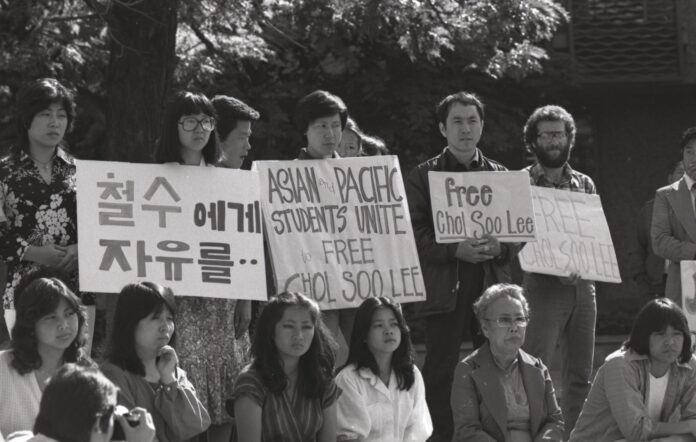This year’s CAAMFest—the annual Center for Asian American Media event formerly known as the San Francisco International Asian American Film Festival—is reaching a milestone with a 40th anniversary edition running this Thu/12 through May 22. But rather than looking backward with any retrospective of past achievements, the fest is instead looking forward as usual, via a raft of rising talents on display, as well as the introduction of recently arrived Festival and Exhibitions Director Thuy Tran.
Actually, there is a certain amount of retrospection on tap, albeit in the form of new documentaries weighing recent history. CAAMFest starts off in that mode with Eugene Yi and Julie Ha’s Free Chol Soo Lee, which recalls a once-notorious case of wrongful conviction (for a gangland murder in SF’s Chinatown) that galvanized Asian American activists for a decade starting in 1973. The Sundance-premiered feature will open the festival at the Castro Theatre, followed by a gala party featuring hip-hop orchestra Ensemble Mik Nawooj at the Asian Art Museum.
Another very San Francisco story is Like a Rolling Stone: The Life & Times of Ben Fong-Torres, Suzanne Joe-Kai’s portrait of the legendary rock journalist—who, coincidentally, lost an older brother in Chinatown gang violence the year before Lee’s travails began. Raised in the Bay Area, he became the “heart and soul” of Rolling Stone Magazine as Music Editor in its first, most influential, SF-based decade.
We hear audiotapes (and see performance clips) of the superstars he interviewed back then, including Jim Morrison, Elton John, Al Green, Stevie Wonder, Ray Charles, Linda Ronstadt, Marvin Gaye, and Paul McCartney. Among those who laud his writing finesse, professionalism, and mentoring in current-day footage are Cameron Crowe, Jann Wenner, Quincy Jones, Bob Weir, Annie Leibovitz, Carlos Santana, and Steve Martin. Fong-Torres chose not to accompany Rolling Stone when it moved to NYC in 1977, and it’s notable that more than one of his colleagues expresses regret all these years later that they too didn’t stay behind in San Francisco. The doc plays Saturday, May 21 at SFMOMA’s Phyllis Wattis Theater; it’s also currently on Netflix.
The “Centerpiece” documentary presentation on Sun/15 at the recently refurbished Great Star Theater in Chinatown is David Siev’s Bad Axe, named after the Eastern Michigan small town where his Cambodian-Mexican family eventually found new roots. But after COVID temporarily shuts down on-site dining at their popular area restaurant, the challenges keep coming—a local faceoff between Black Lives Matters protestors and white nationalist types exposes unreconstructed racism in the very Trumpian population, exacerbated further when “maskholes” take great offense at the eatery’s contagion-prevention restrictions.
Other feature-length documentaries include other personal looks at family immigration/integration sagas, as actor/comedian Alaudin Ullah’s In Search of Bengali Harlem examines his own late emigre father’s complex history, while Crystal Kwok’s Blurring the Color Line investigates a Chinese grandmother’s staking out turf in the Jim Crow era’s segregated American South. There’s also looks at present-day interracial marriage and identity (Caty Borum Chattoo and Leena Jayaswal’s Mixed), Hong Kong pro-democracy struggles (Chan Tze-woon’s Blue Island), and an uphill struggle by Filipino environmental activists (Karl Malakunas’ Delikado).
Also from the Philippines is the “Centerpiece” narrative feature at SFMOMA’s Phyllis Wattis Theater on Sun/21, Martika Ramirez Escobar’s Leonor Will Never Die. A twisty fantasy about a retired filmmaker who gets sucked into the action of her own unproduced screenplay. Another recent Sundance premiere, it promises an imaginative flight as complicatedly meta as Everything Everywhere All at Once.
The next night’s closing feature at Oakland’s New Parkway Theater is Every Day in Kaumuki, whose protagonist is a Honolulu DJ and skateboarder eager to move to NYC—though his live-in girlfriend seems considerably less enthused. Light on plot, Alika Tengan’s film offers an interesting peek at Oahu lives well off the tourist maps.
Another enterprising US indie is Silent River by Chris Chan Lee, whose debut feature Yellow premiered at this festival a quarter century ago. His latest starts out as a David Lynchian mystery set at a desert motel, then begins adding elements of sci-fi and mystic fantasy to its slow-burn storytelling. Just as adventurous at one-fourth the length is My-Linh Le’s half-hour Mud Water, an unclassifiable mix of narrative, poetic essay, and performance as an all-male group of Oakland dancers prepare for a public turfing battle.
Other narrative highlights in CAAMFest hail from Hong Kong (musical biopic Anita, Fruit Chan’s horror comedy Coffin Homes, Jun Li’s fact-based drama Drifting), Vietnam (Ham Tran’s Maika, reportedly that nation’s first-ever science fiction feature), and the US (Young Min Kim’s psychological thriller Dawning, Tom Huang’s family seriocomedy Dealing With Dad).
In addition, the festival’s 40th annum edition (whose in-person events are complemented by online access) encompasses eight themed shorts programs, six panel discussions, live Filipino musical showcase “Pinays on the Rise” the afternoon of Sat/21 at Yerba Buena Gardens, and more.
CAAMFest40 runs Thurs/12-Sun/22 at various San Francisco and Oakland venues. Go to www.CAAMFest.com for full program, schedule, location, and ticket info.







